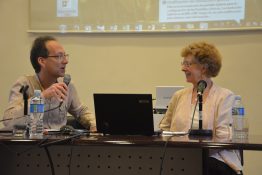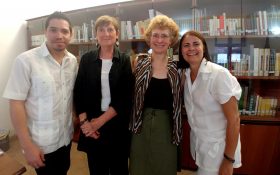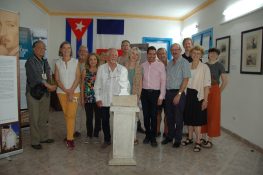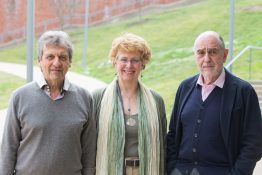Following up on the international Havana, Cuba, colloquium “Victor Hugo, Visionary of Peace,” the Casa Victor Hugo cultural center interviewed several of the Hugo scholars. Here is their interview with Marva in English (the original French version is posted on the Cuba Coopération site).
First would you talk with us about your approach to working on Victor Hugo and tell us what inspired you to study him?
I fell in love with Hugo’s novel Notre-Dame de Paris when I was about thirteen, and I soon realized that I enjoyed Hugo’s poetry a great deal, even though I generally prefer prose to poetry. Years later, I chose as my M.A. thesis subject “The Theme of Love in Chosen Works of Victor Hugo,” including two of his admirable plays. Working on this project, I came to better know Hugo’s immense work and to appreciate why many of contemporaries called him “the Master” (“le Maître”).
Victor Hugo came back into my life about fifteen years ago, when I was looking for a new course topic to teach at the University of Virginia (UVA). When I reread his drama Ruy Blas, I was struck even more than before by Hugo’s genius! This play is comic, tragic, written in rhyming couplets, full of action and love, but mostly full of a true sense of justice. One could find nothing better, I thought. When a French-historian friend talked with me about Hugo’s political and historical importance, I saw that his entire output—poetry, novels, theater, political essays, philosophy, art work—demanded an entire course.
After I taught this course several times, I wanted to open Hugo’s world to people beyond my French students. And so I created my anthology Victor Hugo on Things That Matter (Princeton: Yale University Press, 2010). Today with a friend, who is a mediaeval specialist but also an adroit translator, I’m in the process of re-editing this book entirely in English. As you can see, I aim to bring Hugo’s remarkable depth of thought and scintillating writing (and art work) to a wider, English-speaking public.
You have published three books on Victor Hugo:
- Victor Hugo on Things That Matter
- Lettres inédites de Juliette Drouet à Victor Hugo, with Gérard Pouchain
- To Love Is to Act: Les Misérables and Victor Hugo’s Vision for Leading Lives of Conscience
As a writer and researcher and teacher what would you say about this: How much do young readers—your students—see parallels between the problems of the nineteenth century and today’s? Do they connect to nineteenth-century life and themes?
I find today’s young adults to be deeply interested in problems related to justice, women’s and children’s rights, liberty, world peace, economic inequities, the death penalty, and so on. And they find that Hugo’s perspectives and arguments highly relevant to difficulties challenging us. As evidence I couldn’t do better than point you toward several of my students’ essays in response to this prompt: “With this writing assignment, you have a chance to convince a wider audience about why and how Les Misérables might or might not be relevant to them.” Imagining as their readers the wider public, my students wrote these essays as “op-eds,” in which one expresses an opinion supported by arguments and evidence.
Just a little while before his death Victor Hugo wrote “Aimer c’est agir” (“To love is to act”). Since this phrase is part of your new book’s title, what can you tell us about the context in which the sentence was written, and what meaning do you attribute to it?
Victor Hugo wrote these three words on May 19, 1885, that’s to say, three days before his death. At that point, he had been suffering from a pulmonary congestion for four or five days. “Aimer c’est agir” was the last phrase he wrote (see the Club Français du Livre (CFL) edition of Hugo’s complete works, known as the Massin edition, vol. XV-XVI/2, p. 1079).
“Aimer c’est agir” can in some ways be seen as another version of Hugo’s will and testament, given that these three words summarize both his conception of humanity and his personal actions. For Hugo, love had a vast meaning, denoting love for others, of course, but also a broad love disseminated everywhere throughout the universe, found in all human beings but also in animals and objects as well. As Hugo wrote in his poem beginning “I love the spider . . .” (Les Contemplations III, xxvii) (translation by Robert F. Cook):
I love the spider and I love the nettle
Because everyone hates them;
. . .
There’s nothing without its bit of melancholy;
Everything wants a kiss.
In their beastly horror, if we once leave off
Crushing them,
If once we give them a less prideful glance,
Oh so softly, far from daylight,
The nasty vermin and the no-good weed
Murmur: Love!
Hugo composed this poem in 1855, when he also was writing a narrative poem entitled simply God [Dieu]. There, in the last stanza, Hugo exclaims, “God has only one face: Light! And only one name: Love!” (Dieu, « L’Océan d’en haut », VIII) Clearly, for him, love unites with what he often called the Universal Spirit (which he wrote both with and without capital letters). His daughter Adèle reinforced this idea after having listened to Hugo’s reading of God. She noted in her notebook, “My father finally arrives at his own religion, which is summarized in this great word Love” (Adèle’s emphasis).
For me the significance of Victor Hugo’s last words is obvious. We must love others, and we must act in support of that love. In his personal and political lives, Hugo acted according to what was dictated by his love for humanity and to what his conscience told him. For example, with his wife, Adèle, and their servants, he offered weekly meals to the poor children on the island of Guernsey, beginning in April 1862. These meals continued, with the couple’s sometimes serving the children’s meals, until Hugo departed in 1870 when his exile ended. After returning to France, he never ceased campaigning for amnesty for the Communards, for example, a fight that was fueled by his great love of both liberty of expression and clemency.
In my new book, I explore the various ways in which Victor Hugo acted out of love for humanity both in his life and in Les Misérables: empathy for others, the power of forgiveness, the possibility of improving, the importance of moral rightness and justice, his conception of the universal spirit, and his optimism about progress. In Les Misérables, we find two excellent representations of the idea of acting through love, first in Monseigneur Myriel and then in Jean Valjean. That’s why I chose To Love Is to Act as the book’s main title.
The manuscript of the phrase “Aimer c’est agir” is in the collection of the Maison Littéraire de Victor Hugo in Bièvres, France, where Hugo vacationed with his family and with Juliette Drouet.
What is your relationship with the creators of the musical Les Misérables?
While writing To Love Is to Act, I was primarily interested in what one can learn from Hugo’s novel—but I was intrigued, too, by the great success of the musical Les Misérables (often called Les Mis). And so, of course, I wanted to speak with some of the artists who had created the musical.
With the help of a great friend, I came to know Hugh Jackman, who created the role of Jean Valjean in the 2012 film Les Misérables. After I spoke with Jackman—you will find his insights and comments in To Love Is to Act—I asked him to introduce me to the creators of the musical, Alain Boublil and Claude-Michel Schönberg, and to the film’s director, Tom Hooper. They all kindly agreed to talk with me about their ideas about Victor Hugo and his novel for my book.
I spoke next with Claude Michel Schönberg when the composer invited me to visit his home in London. After our long conversation, he showed me his studio, where he composes. When I mentioned my course about Les Misérables, he offered to come speak with my students at the University of Virginia. Of course, I was of course delighted by this idea!
In the end Claude-Michel and his friend and colleague, Alain Boublil, came twice to UVA for artistic residencies, and we became friends. You can find online the videos of our public conversations in 2014 and 2017. Alain and Claude-Michel generously wrote the foreword for To Love Is to Act.
How did you meet Professor Gérard Pouchain? How did you come to have the idea of working together to create the edition of Lettres inédites de Juliette Drouet à Victor Hugo? Who was Juliette Drouet? What was that experience like?
We met thanks to a happy set of coincidences. In 2004, after I heard the CD “HUGO LIVE” by the Québécois composer and singer Alain Lecompte, I contacted Alain in order to invite him to do his show at UVA—which he did twice!
While working on bringing “HUGO LIVE” to the University, I learned that a French specialist on Victor Hugo and Juliette Drouet was giving a series of talks in Canada. Gérard Pouchain graciously came in April 2005 to speak to UVA students and the public about Hugo in caricature and Victor and about Juliette’s love and letters.
Juliette Drouet (1806-83) met Victor Hugo (1802-1885) in 1833 and remained his companion throughout their lives. An untiring letter writer, Juliette wrote hundreds of letters to her friends and family members. And she wrote multiple daily letters to Victor Hugo—more than 22,000 in total. Rarely expecting him to answer, she used them to stay in touch with the very busy poet, playwright, father, and politician. Her entire epistolary production is progressively being made available to the public and researchers by an inter-university team of scholars who transcribe and annotate each letter in a project led by the Centre d’Études et de Recherche Éditer/Interpréter (Université de Rouen-Normandie), in collaboration with the CELLF 16-21 (Paris-Sorbonne).
If you read French, I recommend the resume of Juliette Drouet’s life by the specialist Florence Naugrette. And if you’d like to plunge into the life and fascinating era of Juliette, I recommend Gérard Pouchain and Robert Sabourin’s biography, Juliette Drouet ou “la dépaysée” (Paris: Fayard, 1992).
How did we come to write our book? During his first stay in Charlottesville, Gérard told me that he had found a group of forty-eight letters from Juliette to Victor in the Harvard University Library. When he asked me whether I would be interested in working with him on an edition of unpublished letters from Juliette in American libraries, I answered “Yes!” with great pleasure. After much research I learned that other letters are held in the libraries of Syracuse University and Yale University—and also in the private Pierpont Morgan Library in New York City (105 letters in total).
Finding these letters was a lovely adventure, taking me to New York, Cambridge, and New Haven. I read most of the letters and ordered reproductions of them for Gérard to transcribe them. His transcription talents are somewhat magical given how much Juliette’s handwriting reflects her exuberant personality! We consulted over the final version of the letters. After they were published by the Press Universitaires de Rouen et du Havre, they joined the site dedicated to Juliette Drouet’s correspondence.
The intimate relationship between Juliette Drouet and Victor Hugo transcended the purely personal. How do you understand Juliette’s role in the writer’s work?
Ah, that’s an immensely important question! To which there are several answers. I will leave it to the specialists of Juliette Drouet’s life and work to tell you about the many ways in which she helped her “cher Toto,” especially her essential role in saving his life, his liberty, and his manuscripts after the December 2, 1851, coup d’état.
What interests me the most? That Juliette was the principal person to copy Victor Hugo’s works, including numerous poems and Les Misérables. She was very proud of making clean copies of the poet’s manuscripts. From time to time in her letters she revealed how much she combined her great love and her admiration for Les Misérables with the same feelings toward Victor Hugo:
“So tell me, my Toto, what’s become of your manuscripts to ”COPIRE”? [“COPIRE” is one of Juliette’s neologisms—a playful deformation of the verb copier (to copy).] Could you have had the effrontery to give them to someone other than myself? I would get really angry, and I would never pardon you. The least I can have, my goodness, since I lack you—whom I cannot have—the least I can have is the consolation of touching with my lips, my eyes, my thoughts, and my soul the admirable things you’ve written” (letter from March 24 [1846], Tuesday afternoon, 3H. 3/4; BnF, Mss, NAF 16362, f. 303-304).
Juliette was the first person to read Les Misérables. Sometimes she read the manuscript at the very moment when the pages left the author’s hands; at other times she listened to Victor read it to her. Most importantly, she copied the entire manuscript—and then, later, worked on the prepping the manuscript for publication. Through her letters about her experiences, Juliette lets us enter that world. It’s captivating!
Juliette herself loved reading Hugo’s novel but was also deeply interested in the technical details of the processes of copying the manuscript and collating the final text. I find Juliette’s interactions with the characters and ideas of Les Misérables especially fascinating. Here are a few of her reactions to Les Misérables that struck me while I was reading Juliette’s charming letters (each is accompanied by a short citation from one of Juliette’s letters, followed by the letter’s date; underlines are Juliette’s):
- Juliette’s attachment to the characters: “this poor sublime villain Mr. Mayor” (Guernsey, April 25, 1860, writing morning, 8H.)
- Her pleasure in helping her dear Victor: “this sweet and charming occupation” (February 14 [1847], Sunday morning, 10H. 1/2)
- Her desire to work, often repeated: “give me something to copy [copire].” (December 23 [1845], Tuesday morning, 9H. 1/4)
- Her humor: “I want my Jean Tréjean. I want him immediately or death.” (January 7, 1847, Tuesday morning, 10H. 3/4; a photo of the first page of this letter is at the Leeds University collection. “Jean Tréjean” is Hugo’s original name for Jean Valjean.)
- Her admiration for the novel and its author: “Everything that comes from you is equally beautiful, interesting, and admirable.” (December 23 [1845], Tuesday morning, 9H. 1/4)
For how long did Juliette help Victor as he was creating Les Misérables? Throughout the entire process. Here are Hugo’s stages of work on the novel:
- November 17, 1845—February 21, 1848 (draft)
- April 25—December 30, 1860 (reading and reflection)
- December 30, 1860—May 20, 1862 (completion)
- March 30—June 30, 1862 (publication)
In Juliette, we find not only the first reader of Les Misérables, as Jean-Marc Hovasse tells us in his magisterial biography of Victor Hugo, but also an ideal reader, given her education, experiences, and emotions. You will find other citations from Juliette’s letters in the resume of my 2017 talk about Juliette and Les Misérables.
Your talk “Jean Valjean, an Emissary of Peace Who Seeks Peace” at the international colloquium on “Victor Hugo, Visionary of Peace,” which was held  in Havana, was widely applauded at the event. Given that many people see Jean Valjean as a violent man, shaped by his convict experiences, how is it possible to see him as an emissary of peace? And what were your impressions of the colloquium?
in Havana, was widely applauded at the event. Given that many people see Jean Valjean as a violent man, shaped by his convict experiences, how is it possible to see him as an emissary of peace? And what were your impressions of the colloquium?
Yes, Jean Valjean left prison a violent man, full of hatred toward society, a man who had become almost an animal (as Hugo tells us) because of his horrific experiences during nineteen years at hard labor. But his experiences with the bishop, Monseigneur Myriel, and with a young chimney sweep, Petit-Gervais, reveal to Jean Valjean what he’s become—and he is horrified by this violent criminal. The next time we see him, Valjean has transformed himself into someone who brings peace to others, an emissary of peace. For example, Valjean makes himself an agent of peace for his adopted daughter, Cosette (and, out of his love for Cosette, for her beloved Marius, too), as well as for the barricade fighters and even Inspector Javert.
But Valjean only rarely finds peace in his own soul: he’s a man who’s looking for peace. Weighed down with anxiety both because society still sees him as a criminal and because Inspector Javert pursues him, Valjean finds peace most often outside of society. How can the troubled soul of a man who has undergone so many injustices contain any form of peace, and how can such a soul manage to bring peace to others? It’s paradoxical! Valjean has nevertheless the capacity to bring peace to others because he is inspired, on the one hand, by Monseigneur Myriel and, on the other, by his respect for what is right as Hugo defines that in his essay “Rights and the Law” [“Le Droit et la loi”], an essay which introduces Hugo’s collection Acts and Deeds [Actes et paroles]).
Led by what is right, incarnating the desire for and tendency toward peace, Jean Valjean shows us personal progress as Victor Hugo envisions it more theoretically in his essay—progress which resembles that which revolution creates, equally paradoxically, for societies. In Les Misérables, Hugo offers us a wide vision of universal peace that includes peace between individuals and peace in one’s soul, as we understand from Jean Valjean’s actions.
My impressions of the colloquium?
It was an honor to join so many lovers and specialists of Victor Hugo and his work. Thanks to such well-documented and well-researched presentations (click for the schedule), I learned a great deal about Hugo as a visionary of world peace in areas as varied as poetry, theater, peace congresses, and universal expositions. I even learned about Hugo’s battles for peace in China and, of course, in Cuba.
I was also delighted by the warm welcome from the entire team at the Casa Victor  Hugo and the library—as well as from the schoolchildren, students and their professors, and the members of Cuba Coopération. And I was impressed that so much music, dance, and poetry accompanied this fascinating academic colloquium experience. I again thank everyone who participated in this beautiful week!
Hugo and the library—as well as from the schoolchildren, students and their professors, and the members of Cuba Coopération. And I was impressed that so much music, dance, and poetry accompanied this fascinating academic colloquium experience. I again thank everyone who participated in this beautiful week!
This was the first time you visited Cuba. What are your impressions of our world? Of us?
After seeing Wim Wenders’ documentary The Buena Vista Social Club about twenty years ago, I wanted to visit Havana because I was so positively impressed by what the film showed of Cuba: the music, the joie de vivre, and, I must say, the cars dating from my childhood. Once I arrived in the capital and at the Casa Victor Hugo, I was struck by Cubans’ kindness and open spirit.
The more I walked in the streets—mostly in Old Havana—the more I was struck not only by the diversity of cultures and ethnicities in Havana, but also by a sense that skin color apparently means nothing. Everyone seems to be part of a large Cuban culture. Like Victor Hugo, I remain optimistic for humanity’s future, even during these tough times, and I hope that we will be able to create in the United States a society truly based on equality while appreciating every individual’s humanity
What saddened me, certainly, was the economic difficulty in which Cuba finds herself. For the future of Cuba, I am grateful for the work of associations such as Cuba Coopération. I would like to see in the U.S. first a return to the more liberal and open policy that existed from 2014-2017, and then the reestablishment of diplomatic relations cultural exchanges and economic relations between the United States and Cuba. I am lucky that Victor Hugo and my French Hugolian friends have brought me into closer contact with Cuba.


